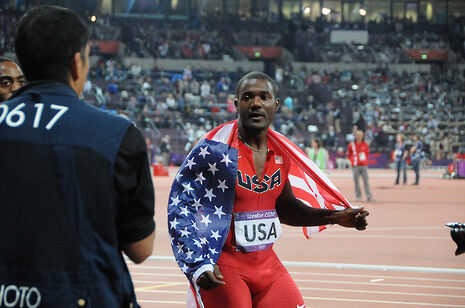Drugs cheats should not be denied the opportunity to fight their corner
The likes of Justin Gatlin, Maria Sharapova, and Tyson Fury are not given the chance to explain themselves by the vultures of the media.

In the media frenzy that is modern sport, the term “drugs cheat” is bandied about an awful lot. Every positive test, every “adverse finding”, and every doping ban leads to a swirling storm of rumours, opinions, and headlines which ruin an athlete’s reputation in an instant. Athletes that cheat are those who dishonestly attempt to gain an advantage through rule-breaking. Contrary to popular belief, relatively few bans are handed out for such dishonesty, and yet “drugs cheat” is repeatedly used to refer to anyone who has been convicted of an anti-doping violation. This needs to change.
Unlike in criminal law, athletes suspected of breaking anti-doping rules are not “innocent until proven guilty”; they are presumed “guilty”. Under the World Anti-Doping Code, “it is each athlete’s personal duty to ensure that no prohibited substance enters his or her body”. Accordingly, “it is not necessary that intent, fault, negligence or knowing use” be demonstrated to establish a violation. Thus, upon returning an “Adverse Analytical Finding”, it is extremely difficult to avoid punishment – and the resulting media backlash.
Given the absolute need to ensure a level playing field, the reasons for this rule are clear. However, it means athletes are sometimes punished despite having no intention to enhance their performance.
Justin Gatlin, perhaps more than anyone, can attest to this. When he won Gold in the 100m at the World Athletics Championships last year, he was booed by the London crowd. Many people – myself included – thought the result a disgrace. How dare he, one of the sport’s most infamous “drugs cheats”, ruin Bolt’s fairy-tale ending?!
Yet, after reading ‘Demonising Justin Gatlin’ by sports lawyer Mike Morgan, I was appalled – at myself, for having scorned what was a stunning victory. Despite continually calling him a “two-times drugs cheat”, few know Gatlin’s full story.
According to the authorities, his first violation was “at most, a technical or a paperwork” violation, after amphetamine from his attention deficit disorder medication showed up in an in-competition test, despite him having stopped taking it days before. As such, he received a mandatory two-year ban. However, the anti-doping panel stated Gatlin was “certainly not a doper”:
“This Panel is very concerned that Mr Gatlin’s reputation not be unnecessarily tarnished as a result of this decision…Mr Gatlin neither cheated nor did he intend to cheat. He did not intend to enhance his performance nor, given his medical condition, did his medication in fact enhance his performance…”
Two months later, the IAAF reinstated Gatlin with immediate effect.
Then, in 2006, he was banned again after testing positive for exogenous testosterone. Gatlin claimed he was sabotaged by his physical therapist, with whom he was in a financial dispute, and who, the night before the competition, allegedly applied a different product to Gatlin’s legs. Having been tested on another 34 occasions, before and after the competition, not one of which indicated the presence of testosterone, his claim was “far from frivolous”. As one panel-member noted, “if sabotage did occur, it would more than likely be impossible for Mr Gatlin to prove”.

Therefore, though he is repeatedly labelled a “drugs cheat”, it has never been proven that Gatlin is anything other than an honest athlete – something he maintains to this day. Why else would a man with nothing left to lose continue to proclaim his innocence?
Unfortunately, he is not alone. In 2013, the Athlete Ombudsman for the US Olympic Committee revealed 40-60% of US doping cases are inadvertent, a trend which is seen worldwide.
Tyson Fury provides just the latest example. He tested positive in February 2015 for nandrolone, a compound naturally produced by the body in small amounts but which, in large amounts, indicates steroid use. However, it is scientifically proven that eating red meat can also lead to increased nandrolone levels. As Fury had been eating large amounts of offal (uncastrated wild boar) whilst training in France, this was the only explanation he could offer. Subsequent tests were all negative which, given intravenous steroids often take time to leave the body, further corroborated his claims. There was, again, far from frivolous evidence suggesting he did not cheat.
And yet, when news of the back-dated two-year ban broke, the Telegraph saw it fit to publish an article which actively called for Fury to be called a “drugs cheat”, a term it also stated is not “incorrect or unwarranted” when applied to Justin Gatlin. It is, frankly, lazy journalism bordering on defamatory.
The list of those whose reputations have been tarnished goes on.
Maria Sharapova was labelled a “drugs cheat” when she received a two-year ban in 2016, having taken meldonium, a drug which was legal for years and whose performance-enhancing effects are strongly doubted. It is taken by many people in Eastern Europe due to reported health benefits, but was added to the prohibited list in January 2016 without prior warning to athletes, despite the fact it can take months to be excreted by the body.
“We should never jump to conclusions when we hear athletes have failed a drugs test”
Sharapova, who had taken the drug over a long period of time, tested positive in January 2016, along with many other Russian athletes, including swimmer Yuliya Efimova, who was booed by spectators and criticised by competitors on her return at the Rio Olympics. She had last taken the drug in 2015, when it was legal.
Mamadou Sakho, Lizzie Armitstead, Kasul Perera, and Patrick Tuipulotu are another four athletes whose reputations have been called into question, only to have their cases thrown out due to mistakes by the anti-doping authorities. We should never jump to conclusions when we hear athletes have failed a drugs test.
Yet, when it was revealed Chris Froome had failed a drugs test, people immediately wrote him off and called for him to be removed from Sports Personality of the Year, but he maintains he did not exceed the permitted salbutamol dose, and is arguing the test result must have been caused by his liver failing to process it properly. Indeed, there is no evidence salbutamol has any performance-enhancing benefits, other than allowing asthmatics to reach the same level as non-asthmatics. Until it is proven otherwise, Froome is not a “drugs cheat”.
Of course, for those who do intentionally seek to enhance their performance, there can be no defence. Lance Armstrong deserved the punishment he received, and cannot argue with being called a “drugs cheat” – as he admitted, his career was “one big lie”. However, there is a big difference between him and Gatlin, Fury, Sharapova or Froome.
The media are all too quick to spread the populist view on doping violations. High-profile cheating cases, like Armstrong’s, have created the idea that anyone who breaches the rules must be a cheat, meaning athletes are forever being unfairly demonised. This is an attitude we need to change, to protect their integrity. Next time you read that a player has failed a drugs test, or has received a doping ban, at least pause to consider that it may not be a cut and dried case. Don’t jump to conclusions. And maybe have a little look into it
 News / Uni Scout and Guide Club affirms trans inclusion 12 December 2025
News / Uni Scout and Guide Club affirms trans inclusion 12 December 2025 News / Cambridge study finds students learn better with notes than AI13 December 2025
News / Cambridge study finds students learn better with notes than AI13 December 2025 News / Cambridge Vet School gets lifeline year to stay accredited28 November 2025
News / Cambridge Vet School gets lifeline year to stay accredited28 November 2025 Science / Did your ex trip on King’s Parade? The science behind the ‘ick’12 December 2025
Science / Did your ex trip on King’s Parade? The science behind the ‘ick’12 December 2025 News / Pembroke to convert listed office building into accom9 December 2025
News / Pembroke to convert listed office building into accom9 December 2025









